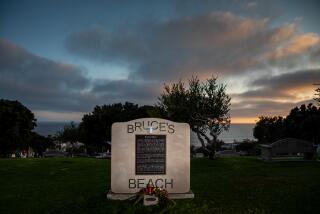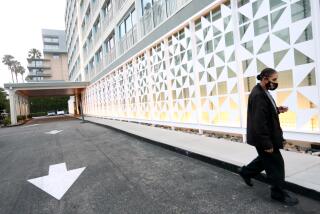The Real Issue Is Revenue
- Share via
A no-nonsense legal opinion issued last week delivers a strong but necessary message to bargain-hunting retailers and cash-strapped cities intent on using eminent domain to clear land for tax-generating storefronts. But the 36-page document written by a U.S. District judge stopped short of addressing the underlying pressure that forces municipalities to embrace a Gold Rush mentality when it comes to generating sales tax revenue.
The Aug. 7 opinion brought a temporary but welcome halt to the city of Cypress in its controversial bid to use eminent domain to take land owned by a church.
Cypress wants to sell the disputed 18 acres to Costco and reap a bonanza in sales tax revenue. Cottonwood Christian Center wants to use the land it bought in 1999 for a huge church complex. The dispute is heading toward a March trial date.
This isn’t the simple church versus state confrontation that some are suggesting. Cypress infringed on the church’s freedom of religion, according to Judge David O. Carter.
And Cottonwood’s cause is being embraced by supporters nationwide who are portraying Cypress as biased against churches. The Becket Fund for Religious Liberty applauded the opinion for sending a strong message that “it’s not right to take a church’s property.”
But it isn’t fair to cast Cypress City Council members as uncaring bigots. The city has gone as far as tabulating the number of churches per capita to show that residents needn’t travel far to find a place to worship. It’s clear that the eminent domain action was driven by economics. Simply put, big retail stores generate sales tax revenue and places of worship generally don’t.
That said, the judge rightfully chastised Cypress for abusing its power. The Constitution’s framers, Carter wrote, “might be surprised to learn that the power of eminent domain was being used to turn the property over to a private discount retail corporation.” Cypress clearly overstepped its authority and Costco shouldn’t be asking cities to do its bidding in the real estate market.
Unfortunately, the underlying issue that prompted the Cypress case isn’t unique.
Sales-tax revenue tops the list when elected officials catalog the strongest influences on land development. Whether it’s the controversial Costco in Cypress or the proposed Home Depot in San Juan Capistrano, the same issue keeps surfacing: How do cities balance revenue needs against the rights of landowners and nearby residents?
A bill wending its way through the state legislature won’t help in Orange County, but AB 680 would take a solid first step toward a statewide solution.
The bill would modify how local sales tax revenues are distributed in the Sacramento area and start to chip away at the emphasis cities now place on projects that will deliver sales tax revenue growth.
So where does this leave Cypress and Cottonwood?
In April we asked the city and church to continue negotiating toward a possible land swap to give the city its prime corner lot and shift Cottonwood to an adjacent property in the shadow of the Los Alamitos Race Course. There is still time for the city and church to go back to the table, and we encourage both sides to do so before the case goes to trial.
More to Read
Inside the business of entertainment
The Wide Shot brings you news, analysis and insights on everything from streaming wars to production — and what it all means for the future.
You may occasionally receive promotional content from the Los Angeles Times.










